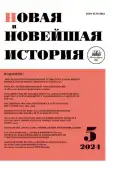Germany’s approach to the functioning of NATO standing force groups in the mid-2010s and early 2020s
- Autores: Trunov P.O.1
-
Afiliações:
- Institute of Scientific Information on Social Sciences, Russian Academy of Sciences
- Edição: Nº 5 (2024)
- Páginas: 229-244
- Seção: Contemporary history
- URL: https://rjsvd.com/0130-3864/article/view/671584
- DOI: https://doi.org/10.31857/S0130386424050187
- ID: 671584
Citar
Texto integral
Resumo
Western democracies have endowed NATO with the functions of “containment” of Russia and influential non-Western powers in general. This process is accompanied by a spasmodic growth of the Alliance’s military capabilities and changes in its internal structure. The principal responsibility for the implementation of the aforementioned measures falls upon the European member states, particularly those which have been members of the Alliance for a considerable length of time. Of these, Germany has demonstrated the most considerable commitment. Although some studies have examined the evolution of the Alliance’s military structures, there is a dearth of literature on Germany’s role in the Alliance within the field of Russian historiography. Nevertheless, an analysis of this topic is crucial for a comprehensive understanding of Berlin’s strategic intentions. The objective of this article is to examine the role of the FRG in relation to the functioning of permanent NATO troops. In order to achieve this, the author employs two distinct theoretical frameworks, namely those of alliance theory and military capability building, in combination with a comparative analysis approach. The author illustrates the distinctive features of the evolution of permanent NATO force groups and elucidates the challenges, including a shortage of military personnel, and opportunities, including limited activity by other NATO member states, that have influenced the utilisation of the Bundeswehr in the functioning of the groups. In light of the aforementioned conceptual and operational documents, which serve as the foundation for Germany’s foreign policy, the article posits that the Federal Republic of Germany is prepared to assume a leading role within the European NATO member state contingent with regard to the operationalisation of multilateral troop groupings.
Palavras-chave
Texto integral
Sobre autores
Philipp Trunov
Institute of Scientific Information on Social Sciences, Russian Academy of Sciences
Autor responsável pela correspondência
Email: 1trunov@mail.ru
ORCID ID: 0000-0001-7092-4864
Scopus Author ID: 57211605240
Researcher ID: AAC-7844-2020
кандидат политических наук, ведущий научный сотрудник отдела Европы и Америки
Rússia, MoscowBibliografia
- Данилов Д.А. Глобальные горизонты атлантического Альянса: «вакцина» Байдена // Современная Европа. 2021. № 5. С. 19–31.
- Истомин И.А. Управление обязательствами в асимметричных альянсах // Международные процессы. 2021. № 1. С. 26–55.
- Кокеев А.М. О соотношении атлантизма и европеизма во внешней политике ФРГ // Мировая экономика и международные отношения. 2009. № 7. С. 21–27.
- Манойло А.В. Современные стратегии кибербезопасности и киберобороны НАТО // Актуальные проблемы Европы. 2020. № 3. С. 160–184.
- Никитин А.И. Тенденции военно-политического развития и военно-технического сотрудничества стран Евросоюза // Актуальные проблемы Европы. 2020. № 4. С. 53–74.
- Сидоров А.С. «Европейская оборона» через призму французских интересов и возможностей // Актуальные проблемы Европы. 2022. № 4. С. 137–169.
- Трунов Ф.О. Политика ФРГ в НАТО на современном этапе: проблемы и перспективы // Актуальные проблемы Европы. 2019. № 4. С. 114–134. doi: 10.31249/ape/2019.04.07
- Danilov D.A. Global’nye gorizonty atlanticheskogo Al’iansa: “vakcina” Baidena [Global horizons of the Atlantic alliance: the Biden “vaccine”] // Sovremennaia Evropa [Contemporary Europe]. 2021. № 5. S. 19–31. (In Russ.)
- Istomin I.A. Upravlenie obiazatel’stvami v asimmetrichnykh al’iansakh [Management of security commitments in asymmetric alliances] // Mezhdunarodnye protsessy [International Trends]. 2021. № 1. S. 26–55. (In Russ.)
- Kokeev A.M. O sootnoshenii atlantizma i evropeizma vo vneshnei politike FRG [On the correlation of Atlanticism and Europeanism in Germany’s foreign policy] // Mirovaia ekonomika i mezhdunarodnye otnosheniia [World Economy and International Relations]. 2009. № 7. S. 21–27. (In Russ.)
- Manoilo A.V. Sovremennye strategii kiberbezopasnosti i kiberoborony NATO [NATO’s current cybersecurity and cyber defense strategies] // Aktual’nye problemy Evropy [Current Problems of Europe]. 2020. № 3. S. 160–184. (In Russ.)
- Nikitin A.I. Tendentsii voenno-politicheskogo razvitiia i voenno-tekhnicheskogo sotrudnichestva stran Evrosoiuza [Trends of military-political development in Europe and of military-technical cooperation between the EU member states] // Aktual’nye problemy Evropy [Current Problems of Europe]. 2020. № 4. S. 53–74. (In Russ.)
- Sidorov A.S. “Evropeiskaia oborona” cherez prizmu francuzskikh interesov i vozmozhnostei [“European Defenсe” through the prism of France’s interests and capabilities] // Aktual’nye problemy Evropy [Current Problems of Europe]. 2020. № 4. S. 137–169. (In Russ.)
- Trunov Ph.O. Politika FRG v NATO na sovremennom etape: problemy i perspektivy [Policy of FRG at NATO today: problems and prospects] // Aktual’nye problemy Evropy [Current Problems of Europe]. 2019. № 4. S. 114–134. doi: 10.31249/ape/2019.04.07 (In Russ.)
- Biscop S. The New Force Model: NATO’s European Army? // Egmont Policy Brief. 2022. № 285. P. 1–6.
- Glatz R., Zapfe M. Ambitionierte Rahmennation: Deutschland in der NATO // SWP-Aktuell. 2017. № 62. P. 2–8.
- Krause von U. Die Bundeswehr als Teil einer Europäischen Armee: Realistische Perspektive oder unrealistische Vision? // BAKS. Arbeitspapier Sicherheitspolitik. 2019. № 18. P. 1–5.
- Major C. Die NATO nach dem Gipfel von Madrid // SWP-Aktuell. 2022. № 49. P. 1–8.
- Pressekonferenz von Bundeskanzler Scholz nach dem NATO Gipfel am 30. Juni 2022 in Madrid // Die Bundesregierung. 30.06.2022. URL: https://www.bundesregierung.de/breg-de/suche/pressekonferenz-von-bundeskanzler-scholz-nach-dem-nato-gipfel-am-30-juni-2022-in-madrid-2059018 (access date: 01.08.2023).
- Pressekonferenz von Bundeskanzler Scholz und dem Ministerpräsidenten von Rumänien Ciolacu am 4. Juli 2023 in Berlin // Die Bundesregierung. 04.07.2023. URL: https://www.bundesregierung.de/breg-de/suche/pressekonferenz-von-bundeskanzler-scholz-und-dem-ministerpraesidenten-von-rumaenien-ciolacu-am-4-juli-2023-in-berlin-2200290 (access date: 01.08.2023).
- Pressekonferenz von Bundeskanzler Scholz zum Gipfeltreffen der NATO am 12. Juli 2023 in Wilna // Die Bundesregierung. 12.07.2023. URL: https://www.bundesregierung.de/breg-de/suche/pressekonferenz-von-bundeskanzler-scholz-zum-gipfeltreffen-der-nato-am-12-juli-2023-2202034 (access date: 01.08.2023).
- The Military Balance 2022. London, 2022.
Arquivos suplementares










